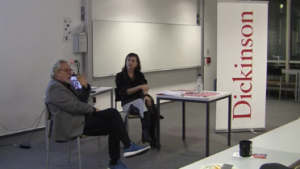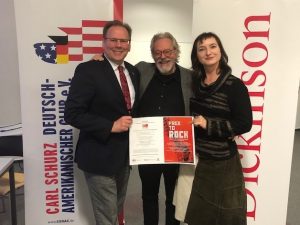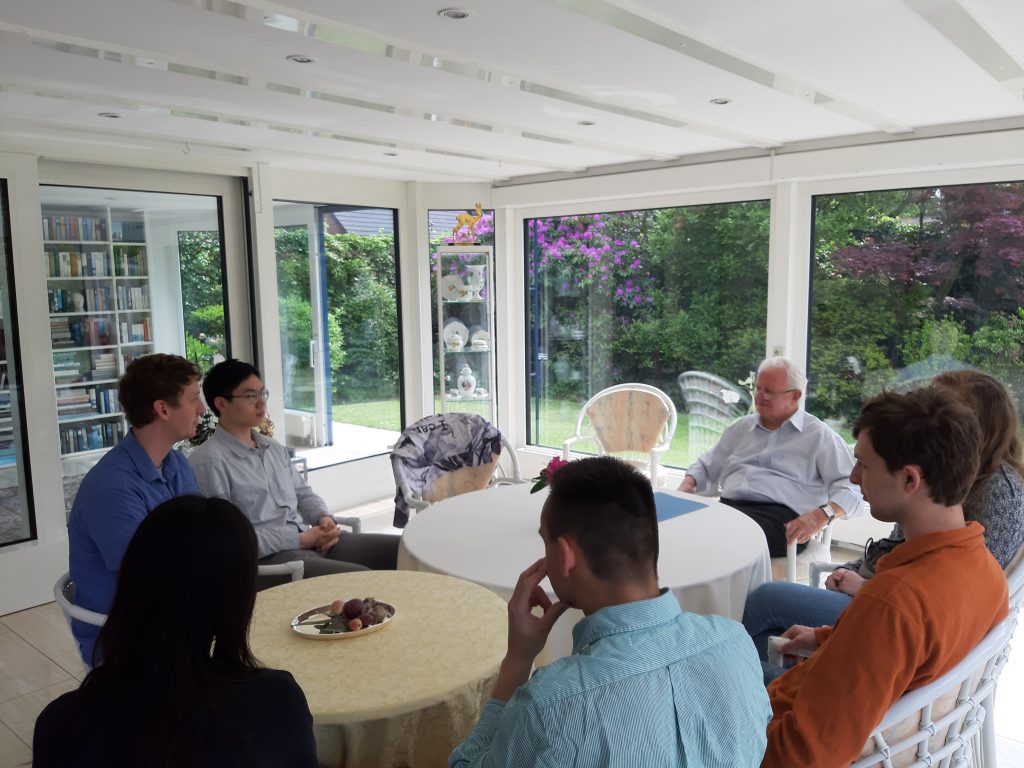In February/March, 2019, we went to Vienna again for a one-week trip. Please read about a few of the highlights:
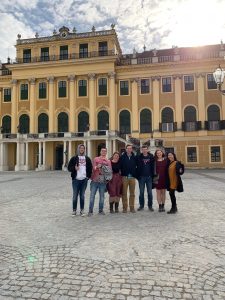 The Schönbrunn Palace would be the most impressive part of the Vienna excursion. As an image of the Habsburg rule, the palace manifests its presence in its sheer size and beauty. Schönbrunn not only introduces visitors into the lifestyles of the old monarchs with fascinating details, but it also lectures them on aesthetics and culture. Indeed, the palace itself is such an visual reward that impressed me with murals and rococo designs. To a certain extent, they divert your attention from learning the influences of Maria Theresia and the other Habsburgs. Schönbrunn is an unquestionable landmark of Vienna that demonstrates a glorious and glamorous part of Austrian history. I would suggest that the palace serves the sole purpose of impressing and exciting visitors, to bedazzle them. It somewhat creates a seemingly beautiful mirage of the royal life that is too good to be true. >Jack Xia ’20<
The Schönbrunn Palace would be the most impressive part of the Vienna excursion. As an image of the Habsburg rule, the palace manifests its presence in its sheer size and beauty. Schönbrunn not only introduces visitors into the lifestyles of the old monarchs with fascinating details, but it also lectures them on aesthetics and culture. Indeed, the palace itself is such an visual reward that impressed me with murals and rococo designs. To a certain extent, they divert your attention from learning the influences of Maria Theresia and the other Habsburgs. Schönbrunn is an unquestionable landmark of Vienna that demonstrates a glorious and glamorous part of Austrian history. I would suggest that the palace serves the sole purpose of impressing and exciting visitors, to bedazzle them. It somewhat creates a seemingly beautiful mirage of the royal life that is too good to be true. >Jack Xia ’20<
Wiener Burgtehater: Settling into my seat in the 4th row of the gallery, the packed theater is buzzing with chatter. Out of the corner of my eye, I see the other half of our Dickinson group a few rows away and we wave excitedly at each other. The lights dim, and the chatter dies down to a murmur, then silence. The play starts. The story revolves around a famous actor, Hendrik Höfgen, who flees to Paris when the Nazi party rises to power. He is persuaded to return to Germany to continue his acting career. Eventually, he is casted as a main character (Mephisto) in the famous play Faust but struggles with accepting a career that’s backed by a Nazi general. Or at least that’s what I understood. In all honesty, I didn’t quite understand 100% of the play, but it was so much fun to watch. Maybe it was because it was my first play, but I thought the staging and effects were so cool and creative. There were huge panels that were moved around, the whole stage revolved, a singing lady descended from the ceiling on a silver hula hoop, latex skin was peeled off, and there was a giant treadmill involved. During intermission we would burst into “What just happened?” and “Wait, but I thought…” We even talked to some Viennese students that were sitting near us, who were happy to take part in our efforts to understand the play. All in all, we didn’t understand everything, but we enjoyed the play very much and we left happy, having experienced some true Viennese Hochkultur. >Karen Hoang ’20<

The crown of the Holy Roman Empire
On the 28th of February, we had the opportunity to go to the Schatzkammer in Vienna. This Treasury was historically a vault in which the von Habsburg family stored valuable objects like jewels, crowns, and clothing, but also important documents like treaties. The Habsburgs exercised control over large swathes of land throughout the medieval and modern periods, at times controlling Hungary, Czechia, Spain, and modern-day Benelux States and Netherlands. As such, the Schatzkammer was full of artifacts of great historical significance. For example, the crown of the Holy Roman Empire, which the Habsburg line held for almost 500 years, was on display towards the end of our tour. Another interesting sight was a “unicorn horn,” in fact the horn of a narwhal, which purportedly had the ability to act as a universal antidote to poison. Aside from that there were many intricate works of weaving and metal working, including the robes worn by the Kaiser of the Austro-Hungarian Empire, the Holy Roman Emperor, and the King of Hungary. One thing that I also found particularly fascinating was the large collection of religious relics in the Schatzkammer, owing the powerful bond between the Habsburg line and the Catholic church. Among these is a piece of wood with a nail hole that supposedly comes from the cross upon which Jesus was crucified, a tooth from both John the Baptist and St. Peter, and a piece of the tablecloth from the Last Supper. For people interested in history or in religion, the Schatzkammer is a place one should not miss. >Corson Ellis ’20<
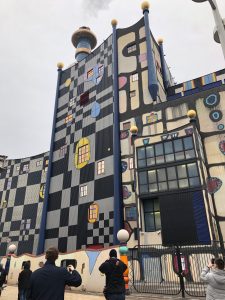
Garbage incinerator, beautified by Hundertwasser
The Dickinson trip to Vienna, Austria, was amazing. Vienna is so beautiful and filled with History; there wasn’t a day that I didn’t learn or experience something new. One of my favorite activities our group did during this excursion was the Hundertwasser tour and museum. Vienna is filled with art and cultural museums, but Hundertwasser was something I hadn’t seen before. This art installation from Friedensreich Hundertwasser is filled with his paintings, sculpture, and unique artistic style. One of Hundertwasser’s trademarks was not using any straight lines. This was incorporated in all of his work, but it was also incorporated into the Hundertwasserhaus itself, which I found interesting. My favorite part of the architecture was the floors because unlike most art museums, these floors are slanted and uneven, which adds so much to the experience. Not only is the artwork itself brightly colored and whimsical, but the entire atmosphere of the building is eccentric and welcoming. The walking tour was also exciting because we got to see other architecture designed by Hundertwasser and learned about his history and the history behind Hundertwasserhaus. >Megan Kropf ’20<
During the Vienna excursion, we took a one-hour train ride to Bratislava. We went to this café called UFO because it is shaped like a UFO and it is one of the highest points in the city. The café is high enough for you to see Austria and Hungary in the distance while on the other side, you can witness the whole landscape of the city. We took a tour around Bratislava since it is not that big of a city. On the way through the city, the tour guide shared interesting facts of the Bratislava and Slovakia such as around 50% of the nation’s economy depends on the car industry, and despite Slovakia being a relatively poor country, it is quite expensive to own a home in Bratislava. We saw the main sites of Bratislava such as the Bratislavaer Burg (Bratislava Castle), Cathedral St. Martin, the Old Town Hall, the parliament’s palace, Michaelertor, and the Blue Church. The tour guide connected the Bratislavaer Burg back to the history of the Hapsburgs, and why it was built and symbolized. After the approximately three-hour tour, we had the whole day to make our own memories and be independent throughout the Slavic city. >Sandi Kadric ’20<
In sum: In Vienna, we learned a lot about the history of Austria and by extension Germany. I never knew much about the history of Austria, so I found the tours and museums very interesting. My favorite part of the trip was learning about the Hapsburg dynasty, and visiting the castles which they lived in. I also enjoyed visiting Vienna’s many churches. One of my other favorite parts of the trip was the day in Bratislava. I knew basically nothing about Bratislava and Slovakia, and I enjoyed learning about the city and its history. >James Moore ’20<

 As reported by the Frankfurter Allgemeine newspaper, the German Federal Minister of Transport, Andreas Scheuer (CSU), awarded the most bicycle-friendly cities in Germany according to ADFC, the General German Bicycle Club. Here, Bremen leads among cities with more than 500,000 inhabitants, ahead of Hanover and Frankfurt.
As reported by the Frankfurter Allgemeine newspaper, the German Federal Minister of Transport, Andreas Scheuer (CSU), awarded the most bicycle-friendly cities in Germany according to ADFC, the General German Bicycle Club. Here, Bremen leads among cities with more than 500,000 inhabitants, ahead of Hanover and Frankfurt.


